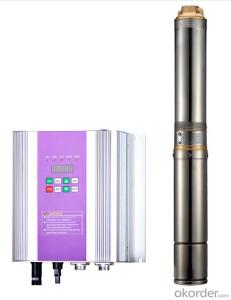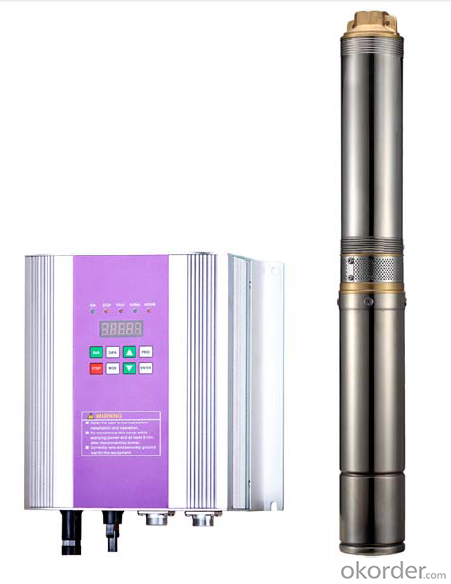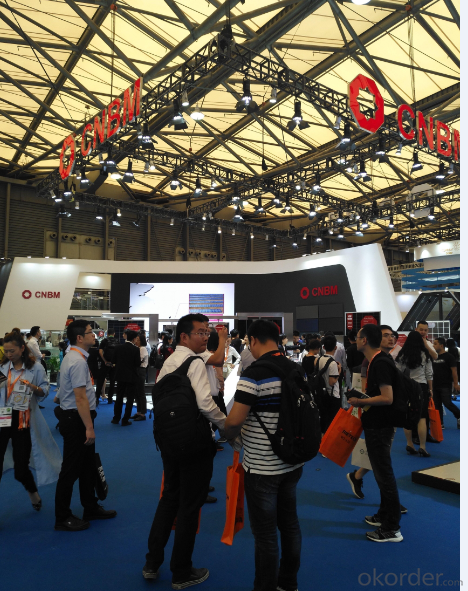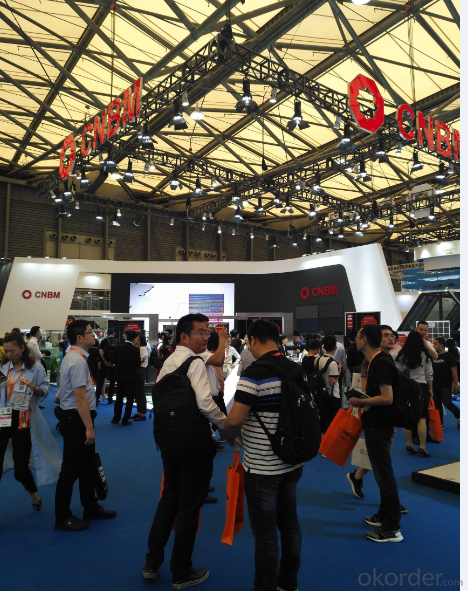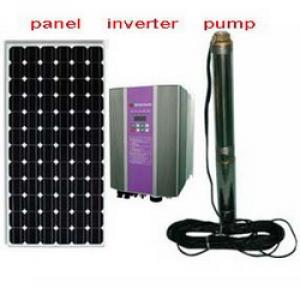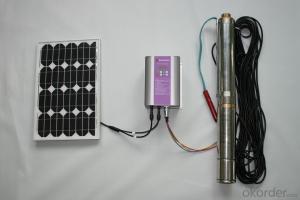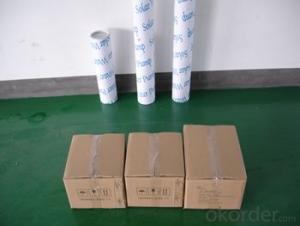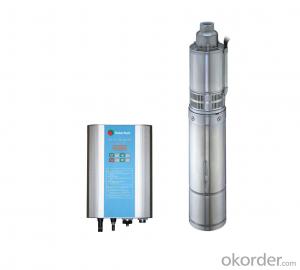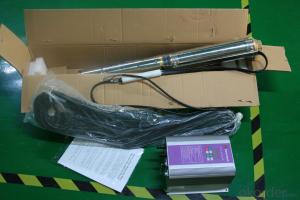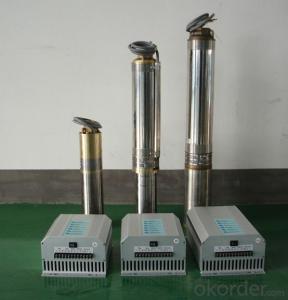Solar Pump DC & AC Water Pump System
- Loading Port:
- China main port
- Payment Terms:
- TT or LC
- Min Order Qty:
- 3 set
- Supply Capability:
- 10000000 set/month
OKorder Service Pledge
OKorder Financial Service
You Might Also Like
CNBM Group is short for China National Building Materials Group Corporation, which is established in 1984 with approval from the State Council
CNBM Group is the largest comprehensive building materials industry group in China
The Group has a total asset of over RMB 360 billion, more than 180,000 employees and 17 subsidiaries, and Solar is part of our business .
Solar water pump contains solar panels +inverter +pump . We have both DC and AC water pump system ,below is part of our products .
For other water head or daily flow ,we can discuss case by case .
Type one:SPA4370010
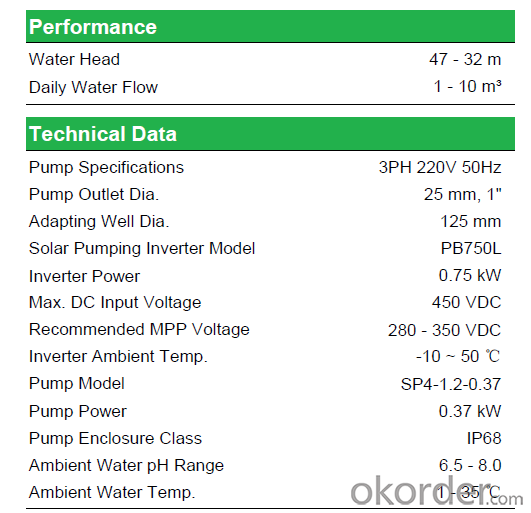
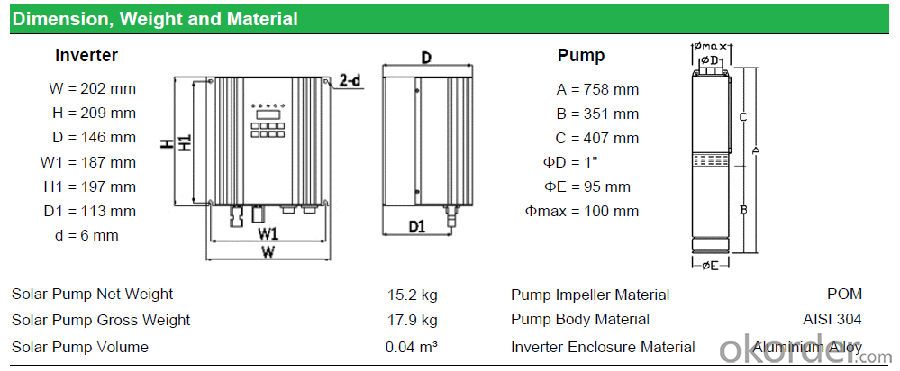
Type two:SPB626K180
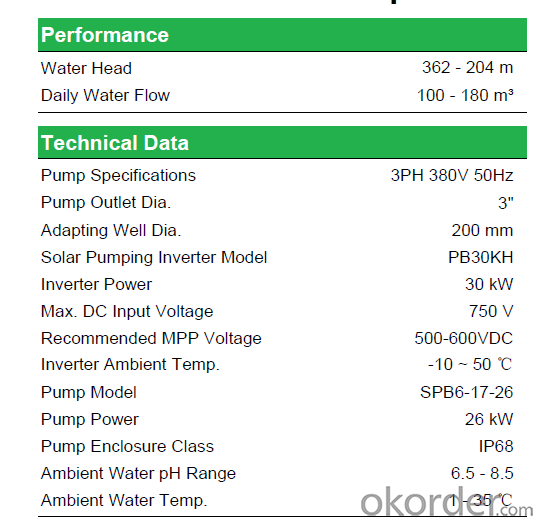
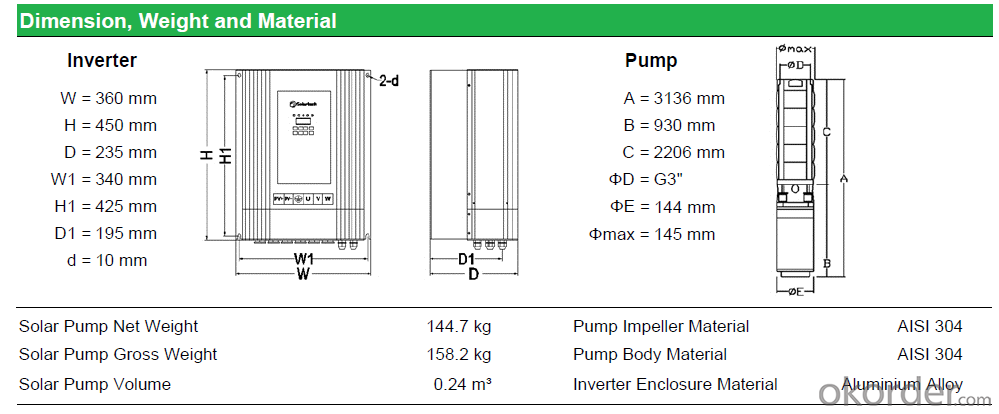
- Q: Can a solar pump be used for residential fountain installations?
- Yes, a solar pump can certainly be used for residential fountain installations. Solar pumps are a sustainable and energy-efficient option for powering fountains, as they harness the power of the sun to operate. They can be easily installed in residential settings, providing a cost-effective and environmentally friendly solution for creating a beautiful and tranquil outdoor space.
- Q: How long does it take to install a solar pump?
- The installation time for a solar pump can vary depending on factors such as the size and complexity of the system, site conditions, and the experience of the installation team. However, on average, it typically takes around 1-3 days to install a solar pump.
- Q: Can a solar pump be used in areas with limited access to water reservoirs?
- Yes, a solar pump can be used in areas with limited access to water reservoirs. Solar pumps are designed to operate using energy from the sun, which makes them suitable for remote locations where there may not be a reliable power source. These pumps can extract water from various sources such as boreholes, wells, or rivers, providing a sustainable solution for water supply in areas without access to traditional reservoirs.
- Q: Are there any limitations on the water pressure that can be achieved with a solar pump?
- Yes, there are limitations on the water pressure that can be achieved with a solar pump. The maximum water pressure achievable depends on various factors such as the design and power of the solar pump, the height and distance the water needs to be lifted, and the capacity of the solar panels. Additionally, the availability of sunlight and the efficiency of the pump's components can also impact the water pressure.
- Q: What is the expected lifespan of the solar panels in a solar pump system?
- The expected lifespan of solar panels in a solar pump system can vary depending on several factors. On average, most solar panels have a lifespan of about 25 to 30 years. However, with proper maintenance and care, they can last even longer. The durability of solar panels is influenced by various factors, such as the quality of the materials used, the manufacturing process, and the environmental conditions in which they are installed. High-quality panels made from durable materials tend to have a longer lifespan. Regular maintenance and cleaning of the solar panels are essential to maximize their lifespan. Dust, dirt, and debris can accumulate on the surface, reducing their efficiency over time. Cleaning them periodically and ensuring they are free from any shading or obstructions can help maintain their performance and extend their lifespan. Additionally, extreme weather conditions such as hail, heavy snow, or strong winds can potentially damage solar panels. However, modern solar panels are designed to withstand these conditions to a certain extent. So, it is crucial to choose panels with good weather resistance, especially if you live in an area prone to severe weather events. In conclusion, the expected lifespan of solar panels in a solar pump system is typically around 25 to 30 years, but it can be extended with proper maintenance and care. Choosing high-quality panels and ensuring they are regularly cleaned and protected from extreme weather conditions can help maximize their lifespan.
- Q: Can a solar pump be used for water supply in a farm?
- Yes, a solar pump can be used for water supply in a farm. Solar pumps use energy from the sun to power their operation, providing a sustainable and cost-effective solution for water supply in remote agricultural locations. They can efficiently pump water from a well, river, or other water sources, making them ideal for irrigation, livestock watering, and other farm water supply needs.
- Q: Can a solar pump be used for irrigation in saline soils?
- Yes, a solar pump can be used for irrigation in saline soils. However, it is important to consider the salinity levels and the specific requirements of the crop being irrigated. Saline soils can pose challenges for plant growth due to the high salt concentration, which can affect water uptake and nutrient absorption. To mitigate these issues, appropriate irrigation management practices, such as using a solar pump with a filtration system or implementing proper drainage techniques, may be necessary. Additionally, selecting salt-tolerant crops can also help optimize irrigation in saline soils.
- Q: Can a solar pump be used for water purification purposes?
- Yes, a solar pump can be used for water purification purposes. Solar pumps can be connected to various water filtration systems to draw water from a source and filter it for purification. The solar energy powers the pump, making it an environmentally friendly and sustainable solution for water purification in areas with limited access to electricity.
- Q: Can a solar pump be used in disaster relief efforts?
- Yes, a solar pump can be used in disaster relief efforts. When a disaster strikes, access to clean water becomes a crucial necessity. Traditional water pumps that rely on electricity or fuel may not be readily available or may have limited supply during such situations. Solar pumps, on the other hand, are powered by sunlight, making them a reliable and sustainable solution for water pumping in disaster-stricken areas. Solar pumps are self-sustaining and do not require any external fuel or electricity supply, which is particularly advantageous in disaster situations where power grids may be disrupted or non-existent. They are easy to install and can be quickly deployed to provide immediate access to clean water. Additionally, solar pumps are low maintenance, reducing the need for constant monitoring and servicing, which can be challenging in disaster-stricken regions. These pumps can be used to extract water from wells, rivers, or any other water sources, providing a lifeline for affected communities. They can be employed to supply drinking water, irrigate agricultural fields, or support sanitation efforts, thus addressing multiple needs during disaster relief operations. Moreover, solar pumps are environmentally friendly, emitting no greenhouse gases or pollutants. This sustainability aspect is crucial in disaster scenarios, as it helps minimize further damage to the already vulnerable environment and supports long-term recovery efforts. In summary, solar pumps offer an efficient, reliable, and sustainable solution for water pumping during disaster relief efforts. Their ability to operate independently of electricity grids or fuel supplies makes them an ideal choice to provide immediate access to clean water in disaster-stricken areas.
- Q: What is the maximum depth a solar pump can draw water from?
- The maximum depth a solar pump can draw water from depends on various factors such as the power of the solar panel, pump efficiency, and the type of pump being used. However, on average, solar pumps can draw water from depths ranging between 100 to 500 feet, with some specialized models capable of reaching even greater depths.
Send your message to us
Solar Pump DC & AC Water Pump System
- Loading Port:
- China main port
- Payment Terms:
- TT or LC
- Min Order Qty:
- 3 set
- Supply Capability:
- 10000000 set/month
OKorder Service Pledge
OKorder Financial Service
Similar products
Hot products
Hot Searches
Related keywords
